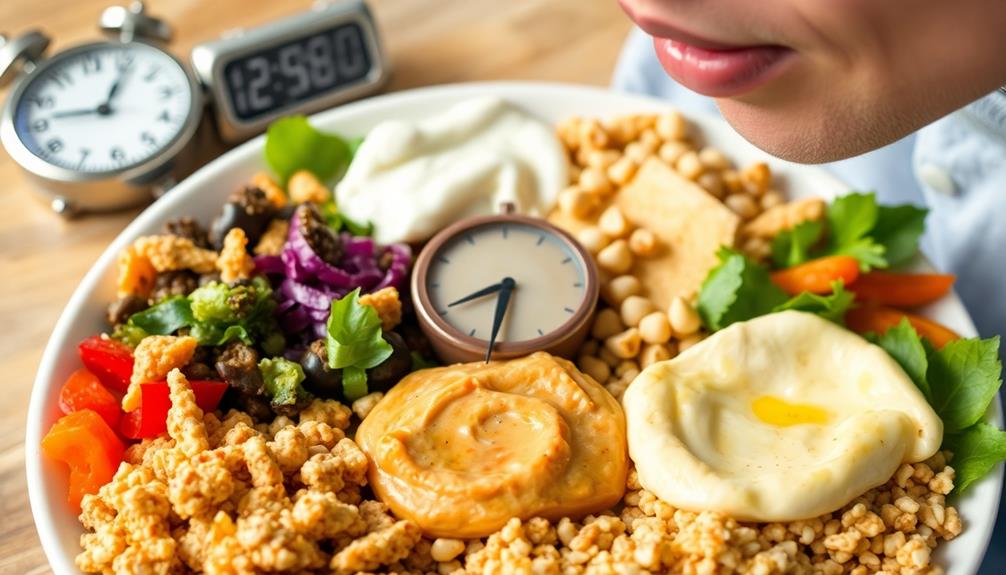Eating too quickly can really disrupt your gut health. When you rush your meals, you're more likely to consume extra calories, which raises your risk of obesity. Fast eating hampers gut hormones that regulate your appetite, making it hard to feel full. This can lead to insulin resistance, a precursor to type 2 diabetes. On the flip side, eating slower enhances your digestion and helps your body recognize fullness better. By being mindful of your eating pace, you can considerably improve your gut health and overall well-being. There's much more to uncover about this interesting topic.
Key Takeaways
- Fast eating disrupts gut hormone regulation, impairing the body's ability to recognize fullness and leading to overeating.
- Eating slowly enhances the release of satiety hormones, which improves appetite control and can aid in weight management.
- Consuming harder, minimally processed foods encourages slower eating, promoting better digestion and increased satisfaction after meals.
- Rapid eating is associated with higher calorie intake, which can elevate the risk of obesity and metabolic syndrome.
- Mindful eating practices, such as communal meals, foster slower eating and contribute to improved gut health and overall well-being.
Eating Speed and Health Risks

When you eat quickly, you mightn't realize the health risks you're inviting. Fast eaters often consume around 120 more calories daily than those who take their time, leading to an increased risk of obesity. This rapid eating disrupts gut hormones that regulate appetite and fullness, causing you to feel hungrier after meals.
Curiously, incorporating fresh, seasonal ingredients into your meals, like those found in dishes such as Nettle and Potato Soup, can enhance your overall well-being and satisfaction from food. As a result, you end up eating even more, compounding the issue.
Research shows that fast eating is closely linked to a higher risk of developing insulin resistance, a precursor to type 2 diabetes, regardless of your body mass index (BMI). Additionally, fast eaters are nearly twice as likely to develop metabolic syndrome, a cluster of conditions that greatly increases the risks of heart disease and stroke.
Factors like high waist circumference and low HDL cholesterol levels contribute to this alarming statistic.
Moreover, the habit of eating quickly can lead to erosive gastritis, as your gastrointestinal tract is subjected to prolonged exposure to gastric acid, increasing the risk of stomach lining inflammation.
Hormonal Responses to Eating Pace

Although many people rush through meals, doing so can greatly impact hormonal responses that regulate hunger and satiety. When you eat quickly, the brain may not register fullness effectively, leading to a misinterpretation of hunger signals. This can disrupt your appetite regulation, making you feel hungrier than you actually are.
| Eating Speed | Hormonal Impact | Health Outcomes |
|---|---|---|
| Fast Eating | Reduced gut hormones | Poor metabolic health |
| Moderate Eating | Balanced gut hormones | Improved glucose control |
| Slow Eating | Increased satiety hormones | Enhanced insulin release |
Research shows that slower eating enhances the postprandial response of anorexigenic gut hormones like Peptide YY and GLP-1. These hormones play significant roles in promoting feelings of satiety. Additionally, slower eating boosts insulin release and glucose control, likely due to increased saliva production facilitating digestion.
Behavioral Patterns Influencing Eating Speed

Eating speed is often shaped by a variety of behavioral patterns that can greatly influence your overall health. For instance, if you grew up in a household with fast eaters, you might find yourself adopting those same fast eating habits. Research shows that 42% of children with fast-eating parents report being overweight, highlighting the familial impact on eating speed.
Busy lifestyles, especially during the COVID pandemic, have also contributed to faster eating patterns, often leading to mindless consumption during virtual meetings. Additionally, enjoying meals like Mushroom Masala can encourage a more mindful approach to eating due to their rich flavors and aromas.
Moreover, education on meal timing and healthy eating is vital, particularly for children. When kids learn about the importance of eating at a slower pace, it can help combat childhood obesity and develop better dietary habits.
Social and cultural dynamics further influence eating speed; communal meals can promote longer dining experiences, while fast food culture pushes for quicker consumption. Recognizing these behavioral patterns is essential in fostering healthier eating practices.
Food Texture and Eating Habits

Food texture plays an essential role in shaping your eating habits and speed. The type of food you choose can greatly influence how quickly you eat and, consequently, your calorie intake.
For instance, harder, minimally processed foods tend to be consumed more slowly than soft, energy-dense foods, like the rich and moist Layered Cake, which can lead to faster eating. This difference can have profound health outcomes.
Consider these factors when evaluating your dietary choices:
- Eating Speed: Slower eating rates promote better digestion and satiety.
- Calorie Intake: Soft foods can lead to higher calorie consumption, impacting weight management.
- Health Outcomes: Consuming harder foods is linked to improved health compared to faster consumption of softer options.
- Gut Health: A varied food texture can enhance your overall gut health by encouraging slow eating habits.
Research Insights and Future Directions

Understanding how food texture influences eating speed sets the stage for exploring the latest research on this topic. Studies reveal a significant connection between eating speed and health outcomes, indicating that faster eating can lead to larger meal sizes and lower satiety levels. Ongoing investigations focus on how eating rate affects metabolic health, particularly through randomized controlled trials.
| Research Focus | Potential Outcomes |
|---|---|
| Eating speed and appetite hormones | Insights into weight management |
| Long-term effects on eating rates | Strategies for obesity prevention |
| Individual variability in responses | Development of personalized nutrition |
| Eating speed and cardiovascular risk | Implications for overall health |
Frequently Asked Questions
Is Eating Fast Bad for Gut?
Yes, eating fast's bad for your gut. It can lead to overeating, disrupt hormonal balance, and increase gastrointestinal issues. Slowing down helps you better digest food, manage calorie intake, and promote overall gut health.
Can Eating Too Fast Cause Intestinal Problems?
Yes, eating too fast can cause intestinal problems. You may experience digestive discomfort, increased hunger, and even inflammation. Slowing down allows your body to regulate appetite better and helps prevent potential gastrointestinal issues.
Does Eating Slowly Help Gut Health?
Eating slowly's like savoring a fine wine; it enhances your gut health. When you take your time, you let your body register fullness, improving digestion and preventing overeating, ultimately nurturing your gut microbiome.
Can Eating Too Fast Cause Health Problems?
Yes, eating too fast can cause health problems. You're likely to overeat, misinterpret hunger cues, and increase your risk of conditions like metabolic syndrome and gastritis. Slow down for better digestion and overall health.
Conclusion
To sum up, your eating speed greatly impacts your gut health, influencing hormonal responses and behavioral patterns. Research suggests that slower eating can enhance satiety and improve digestion, potentially reducing health risks. Curiously, the theory that our ancestors ate more slowly due to the need to chew fibrous foods supports this idea. By adopting a mindful approach to your meals, you might not only enjoy your food more but also promote better gut health for the long run.









